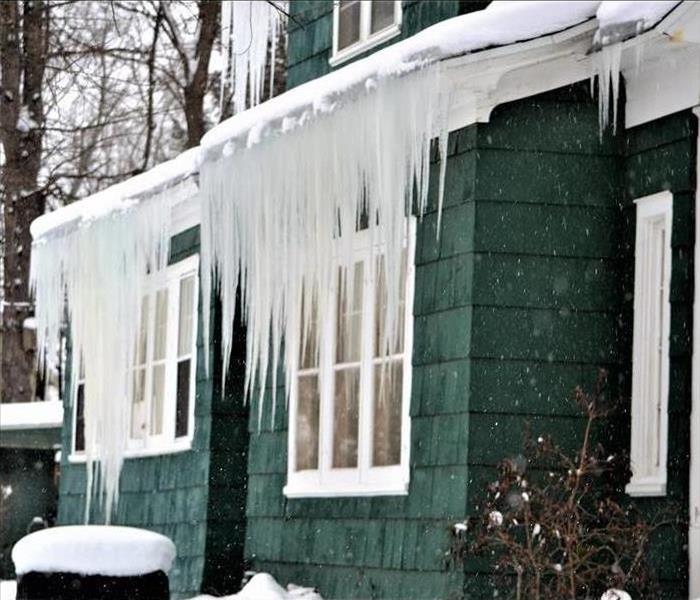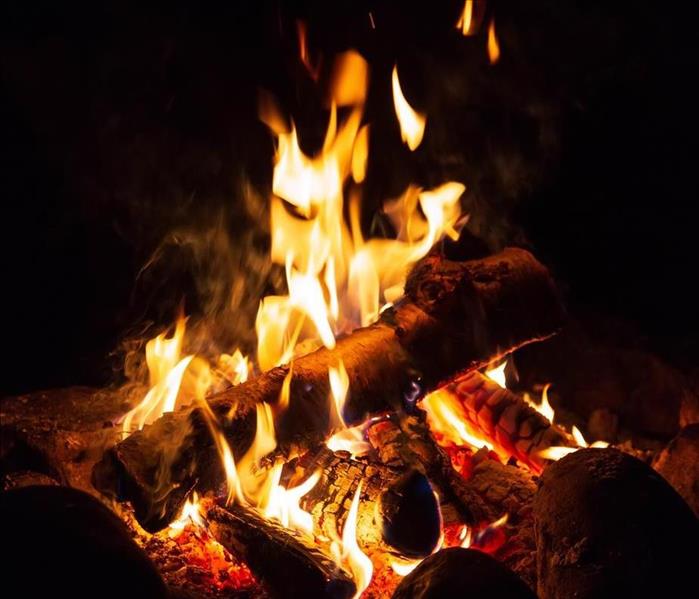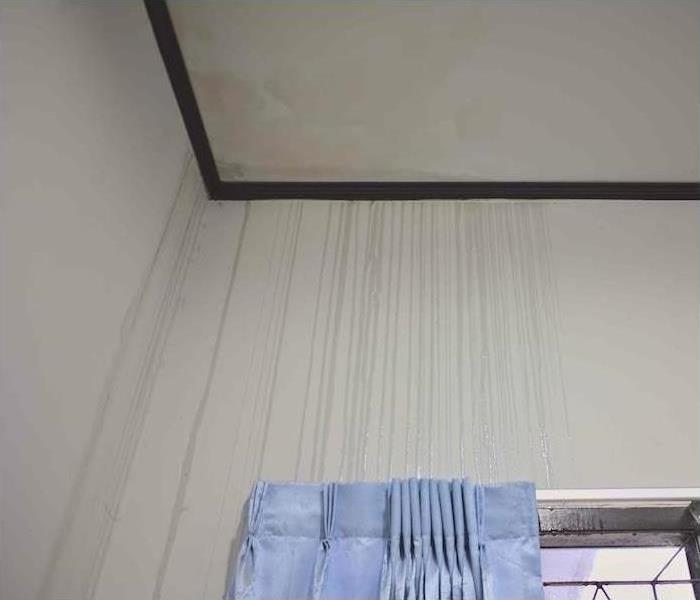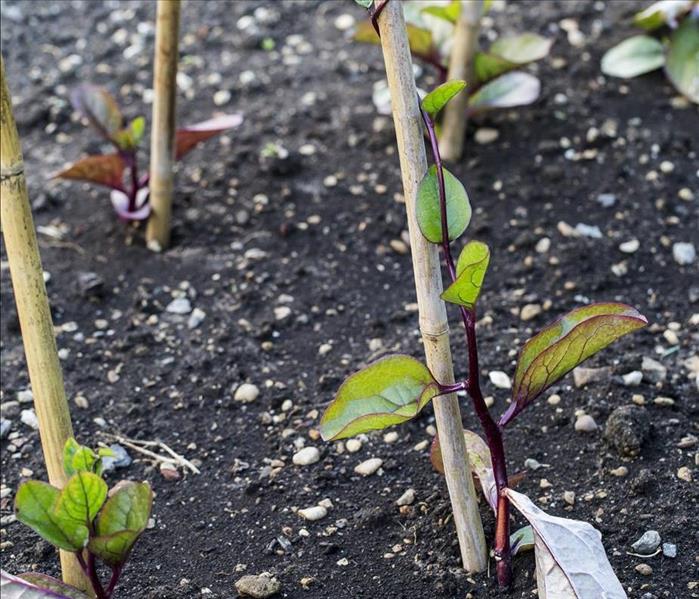Recent Posts
Winter Water Damage
1/8/2025 (Permalink)
 Freezing temperatures, snow, and ice, your home or business could be in jeopardy of water damage.
Freezing temperatures, snow, and ice, your home or business could be in jeopardy of water damage.
Our winters are known to be brutally cold and large amounts of snow are always expected. With below freezing temperatures, snow, and ice, your home or business could be in jeopardy of water damage. It is crucial that you are aware of the hazards and can prepare, prevent or act quickly if faced with winter water damage.
FROZEN PIPES
A frozen pipe can burst at the point where the ice blockage inside the pipe is located, but typically the rupture is caused by the backflow pressure between the water source and the blockage. A burst pipe can cause considerable damage to your property if not addressed quickly.
ICE DAMS
Ice dams can be a major problem during the winter season. They form when heated air melts roof snow downward into water dammed behind still-frozen ice. When the trapped water cannot safely flow or run into the gutter system, it can backflow under the roof ’s shingles and into the structure’s interior areas.
Cold weather, snow, and ice storms can cause severe damage to your home or business. When these types of disasters strike, immediate action is necessary to prevent additional damage to your property. Our team has winter storm experience, expertise, and the resources to remediate damage caused by winter weather. If disaster strikes your home or business during the winter months, know that SERVPRO® has your back.
Get Peace of Mind with SERVPRO® Team Miller
9/26/2024 (Permalink)
 Disasters can catch you off guard, but having a plan in place can make all the difference.
Disasters can catch you off guard, but having a plan in place can make all the difference.
Disasters can catch you off guard, but having a plan in place can make all the difference.
That’s where SERVPRO® Team Miller comes in with our Emergency Ready Profile (ERP). It’s a simple, proactive way to prepare for the unexpected, whether it’s a small water leak or a bigger disaster like a fire or flood.
The ERP isn’t complicated—it’s a plan that helps you know exactly what to do and who to call if something goes wrong. It’s designed to speed up response time and minimize the disruption to your business. Because let’s face it, when disaster strikes, you want things back to normal as quickly as possible.
Establishing SERVPRO as your disaster mitigation and restoration provider gives you access to 50 years experience and a system of more than 2,200 franchises strong. Team Miller has been owned by the Miller Family since 1996, with 24 locations and ongoing aggressive expansion.
We also are one of only 10 designated SERVPRO Extreme Response Teams in North America.
SERVPRO has been named one of America’s Customer Service Champions by USA Today and Plant-A Insights Group with a 4.5-star rating out of 67 industries. We’re honored to have received nearly 520,000 reviews from over 33,000 U.S. customers.
We’re proud to be the only company in the restoration industry included on this prestigious list!
It’s never fun thinking about the “what ifs,” but having a plan can take a load off your shoulders. Let us be your trusted advisor and help you take the steps now to ensure you’re ready for whatever happens.
Prepare for Storms
7/9/2024 (Permalink)
 Storms can be dangerous weather events that leave destruction to your property.
Storms can be dangerous weather events that leave destruction to your property.
Storms can be dangerous weather events that leave destruction to your property as well as cause injuries. Below is a checklist to make sure your home and family are best prepared for any storms, so that you, your loved ones, and your home can stay safe.
- Prepare a Storm Shelter. Include essential supplies such as food, water, a first aid kid, flashlights, and batteries to last a few days in the case of a severe storm or tornado.
- Clear Branches and Dead Trees Around Your Home. The high-speed wind of storms can send dead branches or even trees crashing through your windows, siding and roof. Clearing these objects away from your house is an easy way to make sure they do not cause any damage.
- Secure Outside Objects. If a bad storm is coming up, move large outdoor objects inside to prevent damage to your house and those objects.
- Document Your Valuable Items. Take pictures of valuable items that you can use to show to your insurance provider. If they are damaged or lost in the storm, you’ll have better luck with your claim if you have documentation. Include date of purchase and purchase amount if you have that as well. Bonus points for saving receipts!
- Protect Your Pets. When preparing for storms, pets’ needs can be forgotten about. Make sure to have a plan in place for your pets, whether that is in your storm shelter or if that means having them in a separate safe location for when the storm hits.
SERVPRO® Can Help Your Business
6/10/2024 (Permalink)
 SERVPRO is committed to reduce business interruptions and recovery costs.
SERVPRO is committed to reduce business interruptions and recovery costs.
SERVPRO® is committed to providing expert fire and water cleanup and restoration services to reduce business interruptions and recovery costs. Our team can also provide specialized commercial cleaning services to maintain the best appearance of your facility.
- Fire, Smoke and Soot Cleanup and Restoration: Pretesting helps us determine what type of fire has taken place. Knowing the types of smoke and their behavior patterns are vital to proper restoration.
- Water Removal and Dehumidification: Our professionals identify the source and type of water which determines the proper course of action. Drying equipment controls temperature and humidity, minimizing secondary damage.
- Biohazard and Vandalism Cleanup: SERVPRO franchise technicians are trained to safely and effectively clean biohazardous substances and prepare waste for proper disposal according to OSHA, EPA, and state and local health regulations.
- Mold Mitigation and Remediation: Our professionals work to control and remediate mold contaminants while protecting your health and safety.
- Contents Claim Inventory: Accurate inventory helps keep cost low and reduces job completion time. Our professionals can provide an itemized, area-by-area loss inventory.
Celebrate the 4th of July with Safety in Mind
6/7/2024 (Permalink)
 Celebrating the 4th of July can be a blast – literally.
Celebrating the 4th of July can be a blast – literally.
Celebrating the 4th of July can be a blast – literally. When getting ready to celebrate the long weekend, it’s important to take note of the proper safety precautions to avoid series injury or potential fire hazards when grilling or setting off fireworks to celebrate Independence Day.
Tips for Grilling Safely
- Keep your grill at least 10 ft. away from the walls of your home, garage, etc.
- Never leave a lit grill unattended.
- Never add starter fluid to ignited coals.
- Use long-handed grilling equipment to avoid getting burned.
Safely Setting Off Fireworks
- Stay at lease 500 ft. away from a public, live firework show.
- Keep a fire extinguisher or a supply of water nearby in case any fireworks do cause a fire.
- Never hold any part of your body directly over a firework as you light them to avoid burning your hands, face, chest, etc.
- Keep fireworks out of the reach of children. Always keep children within your sight if they are playing with sparklers.
- If a firework does not go off, do not attempt to light it again.
If an unavoidable fire disaster does occur to your property, know that SERVPRO® is available 24/7/365 to help you with every step of the fire restoration process.
Bonfire Season Is Coming
6/7/2024 (Permalink)
 Follow these tips to have fun and safe summer nights!
Follow these tips to have fun and safe summer nights!
Surrounding a campfire with loved ones creates special memories that you can cherish forever. Putting forth safety measures when having a bonfire can lessen the chances of having fire related injuries and property damage. Follow these tips to have fun and safe summer nights!
Starting the Fire
- Make sure your fire pit is enclosed and there is enough room for a seating area.
- Make sure that your bonfire is 10 feet away from your home or any structures.
- Do not use gasoline or lighter fluid to start or light the bonfire.
Bonfire Safety
- Keep a bucket of water or hose handy in case of emergencies.
- Do not leave the bonfire unattended.
- Keep children and pets away from the bonfire.
- Do not throw fireworks into the bonfire.
- Do not burn aerosols or anything that may produce toxic fumes or explode.
Putting Out the Fire
- Slowly pour water over the ashes and check to be sure that the fire is completely out.
- Use a shovel to spread out the ashes to let them cool down.
Preparing Your Business for Restoration After a Disaster
6/6/2024 (Permalink)
 If a fire, flood or any other cause damages your business, you can always count on us for restoration assistance.
If a fire, flood or any other cause damages your business, you can always count on us for restoration assistance.
What is the most important lesson you’ve learned as the owner of a business?
Many business owners say they have found it’s not always possible to plan for the future—or to see an event that will impact your business coming. Others say they’ve had to find new ways to engage with their customers and continue providing services. These are essential lessons that carry on to other parts of the business, too. It’s crucial to have a plan in place to help you deal with the different types of disasters that business owners can face, like fires, flooding or severe storms.
Because SERVPRO® Team Miller wants to be a resource for business owners in our area, we’ve put together some powerful tips to help you if you ever need commercial restoration services.
What You Need to Know About Starting a Restoration Project
The majority of business owners can open their doors again after a fire or flood damages their business. It’s possible to not only open again but also to be more successful.
Here’s how we recommend you start the process:
- Your disaster plan is a crucial component. Invest in a disaster plan before you need it and do everything you can to follow it in the aftermath of a fire, flood or another type of natural disaster. It’s easy to feel overwhelmed when your business is damaged, so knowing what you will do in advance helps. You may want to think about moving your business to a backup location so you can continue operating.
- Document all your damage. You’ll want to take plenty of pre-cleanup photos of your property to show your insurance company. It’s smart to inventory the items inside your business that were damaged, compromised or destroyed. Include the values of these items on your inventory list.
- Don’t forget to update your community. Providing your suppliers, your employees, your customers and your wider community with regular updates about your progress, a temporary location or your reopening is essential.
- Set up an ERP with Team Miller. We can prepare an Emergency Response Profile to prevent unpredictable seasonal weather from catching you off guard. The profile sets up priority response, a customized restoration plan before an emergency occurs, a single point of contact for multiple facilities and provides local as well as national coverage.
If a fire, flood or any other cause damages your business, you can always count on us for restoration assistance. We have crews who are available 24/7 in the event of an emergency.
Preventing Water Damage in Your Home Starts Here
5/3/2024 (Permalink)
 It’s important to educate yourself about home systems that are designed to prevent water from entering your home.
It’s important to educate yourself about home systems that are designed to prevent water from entering your home.
The perks of owning your own home are great but it also brings a lot of responsibility. Homes are built in a way to provide maximum protection from water intrusion but sometimes those methods fail.
It’s important to educate yourself about home systems that are designed to prevent water from entering your home. Here are some of the most common points of failure in a home that could allow water to go where it shouldn’t:
- Faucets and Sinks. Faucets and sinks are places to check for leaks. Over time, the rubber gaskets in faucets can degrade which can lead to leaks. Sink drains are usually sturdy unless you have a clog and use too much plunger pressure to remove it. Too much pressure from plunging can damage seals, so always use caution.
- Disposals. Garbage disposals are one of the hardest working appliances, and they can spring a link. If you believe you have a leak, check out these tips for finding it.
- Gutters and Downspouts. Gutters and downspouts should be clean and free flowing. They should be inspected regularly and cleared of obstructions and debris. Downspouts should move water at least 30 inches away from the home, and the soil should also flow away from the home.
- Roof Damage. Falling limbs from trees are a real risk to roof systems. They can perforate the roof and damage or clog gutters. Shingles are especially susceptible to falling tree damage. Newer shingles are designed and constructed to be impact-resistant, hopefully reducing the need for expensive roof repairs. But shingles degrade over time, and a falling tree or limb can easily damage an aged shingle.
- Sewer Line Obstruction. This is a serious issue and usually takes a professional plumber to resolve it. Sewer lines can clog for a number of reasons, but two of the most common are root intrusion and grease buildup.
- Sump Pump Defect. A sump pump is designed to move water from a basement or crawlspace to outside the home into a drainage system. When a sump pump fails, water backups can affect your home quickly.
Always Prioritize Safety as You Grill
4/29/2024 (Permalink)
 Keep Grilling Fun, Safe and Fire-Free
Keep Grilling Fun, Safe and Fire-Free
For us, enjoying summer is all about getting outside with family and firing up the grill, but safety is key to making sure this stays a fun activity. Grilling dangers are something many people do not discuss, but as with any open flame, the risk of a grill fire is there every time you light yours up. Fortunately, a bit of prevention goes a long way.
It is reported by the U.S. Fire Administration that grill fires occur at least 5,700 times every year, making them more prevalent than many realize. But grilling can be a fun and safe activity if you follow the proper fire safety protocols when you do it.
Keep Grilling Fun, Safe and Fire-Free
- Create a safe zone around your grill. It is convenient to place your grill in a spot close to your home but giving yourself plenty of surrounding space is important in case of flare-ups. Three feet is the recommended distance to have around your grill, free from wood, siding or any other flammable materials.
- Clean your grill grates often. By keeping your grill grates clean, you can keep the temperature inside your grill steadier and reduce the chances of a sudden fire starting. Built-on food particles can get extremely hot when the grill is in use, even suddenly igniting in some cases. A quick scrape after each grill session can go a long way in reducing this danger.
- Never leave the grill unattended. There is no safe way to ever leave a grill unattended, even if the lid is closed. Fires only take a second to start, so your best bet to circumvent damage is by always being nearby with a fire extinguisher just in case. Even for a quick break, it is best to have someone take over your grill station to keep a vigilant eye out.
- Inspect the grill regularly. The components of a grill are not made to last forever, and even if you are using yours regularly, you never know when something could finally give out. Before you ever light your grill, do a visual inspection to make sure everything looks like it is in good shape and there are no areas that could lead to a gas leak on your connectors.
Protecting Your Garden During Rainstorms
4/19/2024 (Permalink)
 Although our gardens love a nice rain shower, too much rain can be harmful to all the plants.
Although our gardens love a nice rain shower, too much rain can be harmful to all the plants.
Although our gardens love a nice rain shower, too much rain can be harmful to all the plants. After all the hard work you have done to manage your garden, do not let heavy rainstorms ruin it! Follow these tips to protect your garden during heavy storms:
Before Rainstorm:
- Remove damaged limbs and shoots – Removing dead limbs and shoots from your plants will help make them more streamlined and will reduce snapping and tangling.
- Add compost and mulch – Adding a couple of inches of compost to the top 8 to 12 inches of soil will help with drainage.
- Support taller plants – Push wooden or metal support into the ground and tie taller plants to it. This will help keep them stable against rain and strong winds.
- Drainage – Make sure there is a proper runoff that tilts away from your garden and make sure it is not blocked. Water collecting in your garden can be damaging to your plants, possibly drowning them.
During Rainstorm:
- Cover your most delicate plants – Use a waterproof tarp to cover your most fragile plants during heavy rainstorms. Make sure that the covering is not blocking water from draining because it can cause other plants to drown.
After Rainstorm:
- Check your vegetable roots – Once the rainstorm has stopped, make sure there are no exposed roots following soil erosion. If there are exposed roots, cover them with soil or compost before they dry out.
- Check your pots and planters – Pots and planters can easily become flooded if the drainage is blocked. Check them before, during and after rainstorms. You can always cover pots and planters if necessary.
- Pull weeds up by hand – The moist soil after rain means you are much more likely to retrieve the whole root without it snapping or breaking.
Need more tips? Go to The Plant Guide for more information on maintaining your garden during severe weather.



 24/7 Emergency Service
24/7 Emergency Service









